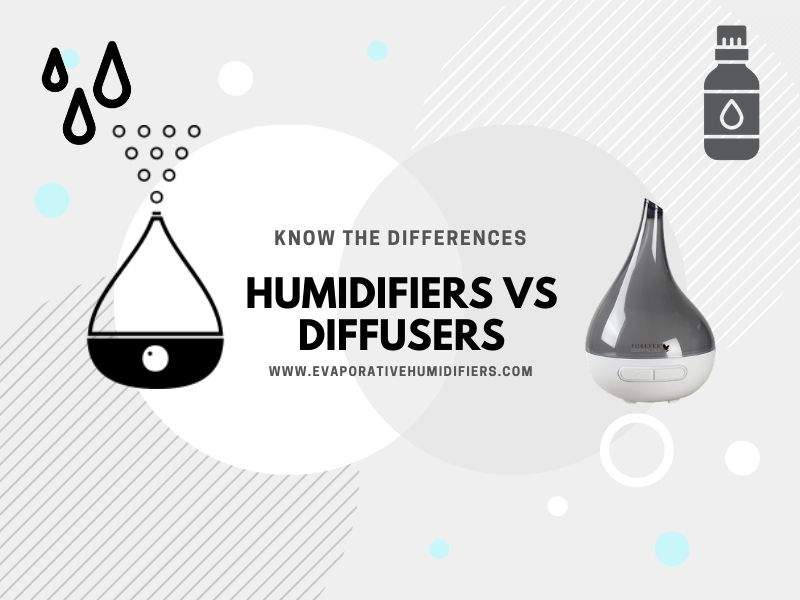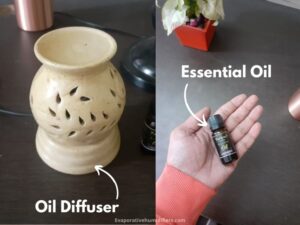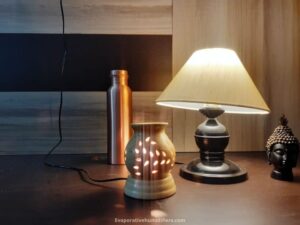Taking care of your house means a lot of work. From cleaning to landscaping, every element of the maintenance is equally important. But, thanks to recent developments in technology, it has become easy and quick to do that than ever before. It is easier to care for yourself and your home, with these inventions that have become an integral part of our everyday lives.
One of the crucial aspects of this is maintaining the environment inside your house. Our environment plays the central in maintaining our well- being. A healthy environment means a happy life. So, as a homeowner, you need to ensure that every corner of the house is taken care of nicely.

Two of the devices that you might have heard about are humidifiers and diffusers. In today’s article, we’ll discuss what these devices do, and when you should buy one for yourself. In addition to that, you’ll get an idea about the differences between the two devices. So, without wasting any more time, let’s get started.
What is a Humidifier?
Low humidity is inconvenient and is a noticeable chink in your house armor. It is, without a doubt, one of the most inconvenient issues that people face. Low humidity can cause damage to your house, property, as well as your health. That is why keeping the moisture in your home at the right level is crucial.
To maintain the right humidity levels in your house, you can choose from various devices. A humidifier is a device that is ideal for alleviating the low levels of humidity.
Humidifiers are your one-stop for all problems related to low humidity. There are natural humidifiers like a house plant, a towel dipped in a steel bowl filled with water, and other easy to make solutions that come in handy.
But, these solutions are not always reliable, and when the problem is extensive, these solutions can fall short of delivering the desired results.
That is where the branded humidifiers come in.
Based on the size of the area that needs to be humidified, we can divide humidifiers into two categories, portable and whole-house/commercial units.
Portable humidifiers are good enough for smaller areas like cupboards, small to medium-sized rooms, and storage areas. On the other hand, whole- house or commercial units come in use for the entire house, or settings like factories, large storage areas, and so on.
In terms of their operation, you can divide humidifiers divided into different categories such as evaporative humidifiers, impeller humidifiers, vaporizers and, ultrasonic humidifiers. These humidifiers either produce cool mist or warm mist or, in some cases, such as a few ultrasonic models both.
Let’s see what are the various uses of humidifiers.
- Low humidity can be a cause for static electricity buildup inside the home. This static electricity inside your house can cause a lot of problems and can cause damage to all the electronics inside your house. Using a humidifier restore the right humidity, and prevents static electricity buildups inside the house.
- Low humidity can cause the dryness of skin, and it can also do similar harm to your hair. The dry, flaky, and itchy skin is uncomfortable, and using a humidifier can help in restoring the moisture to your skin, making it soft again. Similarly, your hairs and scalp also benefit from the use of a humidifier.
- Low humidity can cause cracking of furniture, and plants inside your house that require moisture also suffer in low humidity settings. A humidifier is a perfect solution for keeping your furniture, books and documents, electrical appliances, and even your walls from being damaged by low humidity.
- People who suffer from any health issues like allergies, asthma, flu, sore throat, and many other similar conditions also benefit from the use of a humidifier. Proper moisture in the air also helps people sleep better and snore less.
The next device we’re going to discuss is a diffuser or an essential oil diffuser to be more accurate. Let’s get into it.
What is an essential oil Diffuser?
An essential oil diffuser is a device made for people who want to enjoy the benefits of aromatherapy. Aromatherapy practice is popular among people, and there are a lot of different essential oil diffusers as well as essential oils that people use.
There are different types of oil diffusers that help diffuse the essential oils into the environment. Depending on how you want your experience, you can choose between these types.
A nebulizer is a type of essential oil diffuser that diffuses oil in the purest sense. It does so by breaking the oil molecules into smaller particles while preserving their essence.


There’s also heat diffusers, which make use of heat to diffuse the oil. These diffusers have a tray next to a heat source, and the oil is diffused slowly with the applied heat. These may sometimes alter the chemical essence of the oils, resulting in a limited experience.
Then there’s the evaporative oil diffuser, which uses a wick, and a fan to diffuse the oil. Users can also opt for the ultrasonic models which use vibrations to disintegrate the oil, which comes out as a mist into the room.
An essential oil diffuser’s prime motive is to diffuse essential oil into the environment or therapeutic or recreational purposes.
Uses of an essential oil diffuser
First, and foremost, an essential oil diffuser is used by people for Aromatherapy. Aromatherapy is the practice of using essential oils for psychological and physical well- being. Diffusers help in disintegrating the essential oils down into smaller particles and release them into the air. These oils have therapeutic qualities, and some of these oils also smell very nice.
Many of the oils that are used by users smell good as well, along with being therapeutic. So, users can also use their diffusers for recreational purposes. You can use the fresh fragrance to create an environment to meditate, or you can lie down to rest and get transported by the aroma.
Many diffusers use water for diffusing the oil, such as some ultrasonic models. So, these diffusers are also useful in dehumidifying your space. Although most oil diffusers are not high capacity, some hybrid models are perfect for both tasks.
Now, let’s examine these to devices in comparison to one another.
Design
Humidifiers and Oil diffusers have two different purposes. Whereas the humidifier humidifies the environment, a diffuser works to diffuse the essential oil into the air. So, the design of both devices varies for the most part. In most humidifiers, you can not add essential oils as it might damage the humidifier, and may produce low to no effects. The same is the case with most diffusers, as they don’t use water.
However, the design of both devices, although not similar in all regards, does overlap in some instances. For example, both evaporative humidifiers and diffusers use a wick and a fan for evaporating water and oil, respectively.
Operation
Different humidifier types work a little differently from each other. Evaporative humidifiers use a wick and a fan to evaporate the water, whereas an impeller humidifier uses a rotating disc and an impeller to do the same. Then there are the vaporizers that use a heating element to boil the water. Ultrasonic humidifiers use ultrasonic vibrations to create a fine mist.
The evaporative diffusers use a wick and a fan, just like the evaporative humidifier. A heat diffuser uses a heat source and an oiled tray. A nebulizer breaks down the oil into smaller units. Ultrasonic diffusers also work similarly, as they do in humidifiers.
So, there are overlaps in terms of operation in some types and not in others.
Use
In terms of use, both of these devices have their tasks predefined. You can use a humidifier to add humidity to your space, and you use an essential oil diffuser to release essential oils into the air. Some models can do both, i.e., humidify the room, as well as diffuse the oils. But, most humidifiers do not come with diffusers, and most diffusers don’t make good humidifiers either.
Safety and Maintenance
For the most part, these devices are safe, if used carefully. You should, however, consult with experts before using essential oils. You are not supposed to put essential oil in a humidifier that does not have a diffuser tray. The same goes for diffusers. Both devices require regular maintenance. However, due to their size, humidifiers require more effort.
Cost
It depends on the model, but generally speaking, humidifiers are more costly. Since humidifiers can vary a lot in their make and design, and have more applications than essential oil diffusers, they cost more.
Conclusion
Both devices serve different purposes. If you are looking to bring the moisture in your environment back to the right level, you should get a humidifier. You can use an essential oil diffuser to diffuse various oils for aromatherapy. However, if you want to both humidify and diffuse essential oils, you can go for a hybrid unit.